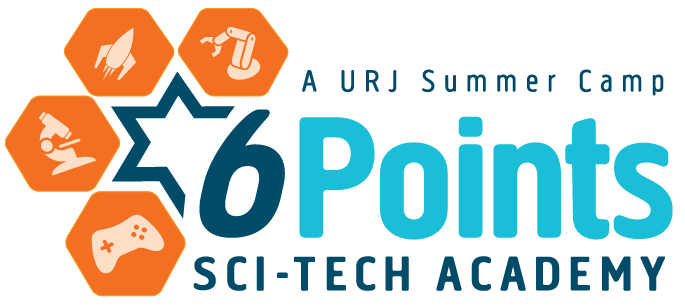By Laura Lusardi, Astrophysics Instructor
A love of science is a force that brings all different kinds of people together. As a physics major, I am incredibly passionate about science and astrophysics and I’m excited to share that passion with other like-minded people. A little-known fact about me among our staff and campers is that I am not Jewish. So, to answer the question on everyone’s minds: what’s it like to be at a Jewish summer camp when you’re not Jewish? Well, to put it simply, it’s incredible. Everyone here has been so patient, kind, and welcoming to me and I’m extremely proud to be a part of such a remarkable group of people who value b’tzelem elohim, or radical acceptance.
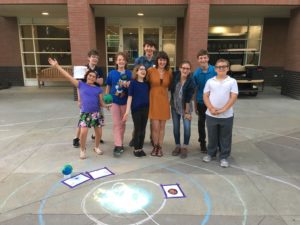 As someone who is not Jewish, I was more than a little nervous to come to camp, because I knew nothing of Judaism and suddenly I was hired to teach astrophysics while incorporating Jewish concepts. Going into it, I was of the mindset that science and religion were two entirely separate things. Growing up it was always taught in history class that science and religion were in a constant state of opposition, as science seeks to provide answers to the “how” of the natural world, while religion seeks to answer the deeper question of “why”. During my time here at camp and with the support of our staff and advisors, I’ve been steadily unlearning this preconceived notion, as each and every day spent here is proof that science and Judaism can coexist.
As someone who is not Jewish, I was more than a little nervous to come to camp, because I knew nothing of Judaism and suddenly I was hired to teach astrophysics while incorporating Jewish concepts. Going into it, I was of the mindset that science and religion were two entirely separate things. Growing up it was always taught in history class that science and religion were in a constant state of opposition, as science seeks to provide answers to the “how” of the natural world, while religion seeks to answer the deeper question of “why”. During my time here at camp and with the support of our staff and advisors, I’ve been steadily unlearning this preconceived notion, as each and every day spent here is proof that science and Judaism can coexist.
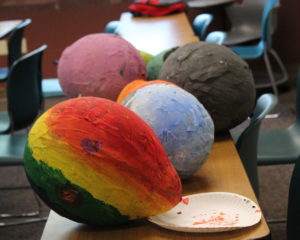 In astrophysics we begin by discussing where it all began. The root of all science is in curiosity; one of camp’s tenants. Humans have always been curious of the world around them. The earliest humans have admired and studied the stars, tying the motions of celestial bodies to religious significance. Today, humans remain curious about the world around them and we have exponentially-increasing technology allowing us to gaze ever further into the depths of our universe. Astrophysicists are driven by the questions “how” and “why.” But wait – so is religion. Everything can be broken down into physics and mathematics and in understanding the smallest motions here on Earth, we can in turn understand the laws governing the planets, stars, galaxies, the entire universe; but it all begins with curiosity.
In astrophysics we begin by discussing where it all began. The root of all science is in curiosity; one of camp’s tenants. Humans have always been curious of the world around them. The earliest humans have admired and studied the stars, tying the motions of celestial bodies to religious significance. Today, humans remain curious about the world around them and we have exponentially-increasing technology allowing us to gaze ever further into the depths of our universe. Astrophysicists are driven by the questions “how” and “why.” But wait – so is religion. Everything can be broken down into physics and mathematics and in understanding the smallest motions here on Earth, we can in turn understand the laws governing the planets, stars, galaxies, the entire universe; but it all begins with curiosity.
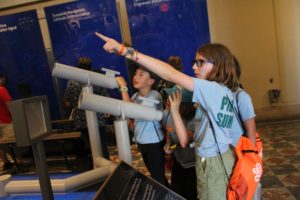 In my workshop, we’ve had in-depth conversations connecting concepts in astrophysics to aspects of Judaism. One such example is the discussion of a Shabbat prayer about God ordering the stars, where we considered what this means in an astrophysical sense. On a cosmological scale, the stars really are ordered in some fashion. Gravity is one connecting force in our universe, pulling everything, including the stars, together. The campers contested that God may not be a person, but rather a force of nature and in that sense, God really might order the stars. This is but one example of the creativity here at Sci-Tech.
In my workshop, we’ve had in-depth conversations connecting concepts in astrophysics to aspects of Judaism. One such example is the discussion of a Shabbat prayer about God ordering the stars, where we considered what this means in an astrophysical sense. On a cosmological scale, the stars really are ordered in some fashion. Gravity is one connecting force in our universe, pulling everything, including the stars, together. The campers contested that God may not be a person, but rather a force of nature and in that sense, God really might order the stars. This is but one example of the creativity here at Sci-Tech.
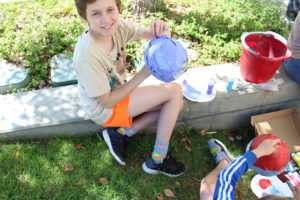 During my short time here thus far, I’ve had the wonderful opportunity to see into a different world; a world where science and religion are two parts of a whole. Sci-Tech West is a community that cares about each other and promotes the growth and the sharing of knowledge with one another. I’ve learned so much here, both from the staff and from the kids as well, and I look forward to continuing the journey with those here at camp.
During my short time here thus far, I’ve had the wonderful opportunity to see into a different world; a world where science and religion are two parts of a whole. Sci-Tech West is a community that cares about each other and promotes the growth and the sharing of knowledge with one another. I’ve learned so much here, both from the staff and from the kids as well, and I look forward to continuing the journey with those here at camp.
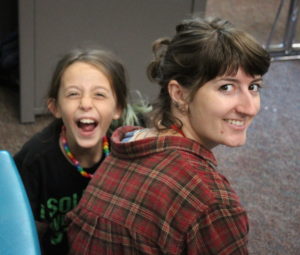 Laura is a recent graduate of the Physics program at University of Wisconsin, River Falls, where she conducted extensive research with the IceCube Project. Her work focuses on deep space and subatomic particle detection in order to get closer to the answer to the question: “where do we come from?”. She loves cheese, the outdoors, and NASA.
Laura is a recent graduate of the Physics program at University of Wisconsin, River Falls, where she conducted extensive research with the IceCube Project. Her work focuses on deep space and subatomic particle detection in order to get closer to the answer to the question: “where do we come from?”. She loves cheese, the outdoors, and NASA.
